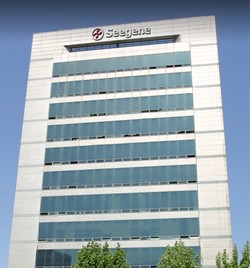Seegene, once hailed as a beneficiary of the Covid-19 pandemic, has reported a significant deterioration in profitability due to a drastic decline in related sales as the world transitions to the endemic phase of the virus.

The company announced its preliminary financial results for 2023 last Friday, revealing consolidated revenue of 367.4 billion won ($275.1 million), an operating loss of 30.1 billion won, and a net income of just 0.5 billion won.
These figures represent a steep decline from the previous year, with revenues down 57 percent from 486.2 billion won and net income plummeting 99.7 percent from 181.9 billion won. Notably, the company turned to red after reporting an operating profit of 196.5 billion won in 2022.
Following a record-breaking year in 2021, with sales reaching 1.37 trillion won, Seegene has seen a continuous downturn in performance, with revenues falling to 853.6 billion won in 2022 and further to 367.4 billion won last year.
The primary reason for the downturn is attributed to the decrease in sales related to Covid-19 as the pandemic has officially turned to an endemic stage.
However, despite the decline in Covid-19 product sales, the company highlighted that its non-Covid product sales have been steadily increasing.
According to Seegene, total sales from diagnostic reagents and extraction reagents combined accounted for 288 billion won last year, making up 78 percent of the total revenue.
Non-Covid reagent sales amounted to 215.4 billion won, comprising 84 percent of total diagnostic reagent sales. In contrast, Covid-19 reagent sales accounted for only 40.9 billion won, or 16 percent.
The non-Covid reagent sales have shown a positive trajectory, increasing from 94.6 billion won in 2020 to 125.2 billion won in 2021, 164.2 billion won in 2022, and 215.4 billion won last year.
The increased sales of non-Covid-19 products drove Seegene's fourth-quarter revenue past 100 billion won. Additionally, the company achieved a profit in operating income of 3.5 billion won, indicating a potential turnaround in its financial performance.
Meanwhile, Seegene is preparing for a comprehensive transformation into a global biotech distribution company, focusing on long-term business strategies such as technology-sharing projects.
One example of this approach is the agreement signed with Microsoft in January. This partnership aims to accelerate digital innovation through the convergence of biotechnology (BT) and information technology (IT).

